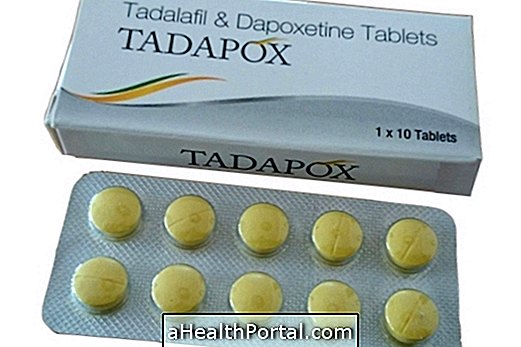Sore throat is a common symptom characterized by inflammation, irritation and difficulty swallowing or speaking that may be alleviated with the use of remedy for sore throat such as Nimesulide.
The sore throat may be transient and be accompanied by an influenza, or it may be persistent, especially in people suffering from tonsillitis.
See the image below for the differences between the healthy throat and the sore throat. When in addition to redness in the throat other symptoms are present such as thrush, swelling or very large tonsils and even dots of pus, it is advised to go to the doctor for it to indicate the appropriate treatment, which can be done with anti-inflammatories and antibiotics.

Sore throat remedies
Some examples of sore throat remedies are Ibuprofen, Amoxicillin, and Nimesulide, which may be prescribed by your doctor to combat sore throat and fever.
These medicines can sometimes be bought without a prescription, but self-medication is discouraged because it is harmful to health. Taking the wrong medicine can aggravate the infection, worsening the symptoms, in addition, every medication has side effects and contraindications and therefore should only be used with the knowledge of the doctor.
Homemade remedies like gargling warm water and salt, and eucalyptus honey teas generally help relieve symptoms without contraindications. See other examples of home remedies for sore throat.
Home Remedies
Nutritionist Tatiana Zanin indicates in this video which are the best home remedies to combat throat inflammation:

What to take for sore throat
What can be done to relieve the discomfort of sore throat is:
- 2 tablespoons of honey enriched with 5 drops of propolis;
- Ginger tea with cinnamon up to 4 times a day;
- Analgesics, such as Benalet or Paracetamol tablets, under medical advice;
- Anti-inflammatories for a sore throat, such as Ibuprofen or Diclofenac, after medical advice;
- Gargarejos with pomegranate peels 2 times a day: put 6 g of peels together with 150 ml of water. Let it boil for a few minutes, let it cook.
If the sore throat does not stop after 3 days or if there is fever or worsening of symptoms the doctor should be consulted.
When sore throat is frequent and there is a pus in the throat, the doctor may even recommend surgery to remove the tonsils. Learn more about this surgery.
How to Cure Sore Throat in Pregnancy
The sore throat in pregnancy may arise as in any other period of a woman's life, however, there should be extra caution with the medicines taken. Thus, sore throat can be treated with home remedies such as gargling with warm water, lemon and salt.
However, when the sore throat in pregnancy is persistent, the obstetrician may indicate the ingestion of antibiotic medicines, such as Cefaclor or Cephalexin, which do not impair gestation and may be taken for up to 14 days.
Common Causes of Sore Throat
Some common causes of sore throat are allergies, flu, pharyngitis, stomatitis, excessive smoking, reflux, or tonsillitis. However, in some cases, it may also be a sign of laryngeal or throat cancer. Other common causes are:
1. Constant or persistent sore throat, which lasts for more than 4 days, is usually caused by an infection, such as tonsillitis, and should be evaluated by a general practitioner to initiate the intake of antibiotics such as Amoxicillin or Penicillin.
2. Sore throat and ear can be indication of inflammation of the middle ear and therefore it is recommended to consult an otolaryngologist to evaluate its cause, since it may be necessary to take anti-inflammatory drugs, such as Diclofenac.
3. Throat pain when speaking may be related to pharyngitis or laryngitis and should be observed by an otolaryngologist in order to initiate appropriate treatment with antibiotics or anti-inflammatories.
4. Frequent throat pain is an important symptom of weakened immune system and therefore the patient should consult the general practitioner and increase the intake of foods with vitamin C, such as orange or kiwi, which help increase the body's defenses. See also: How to boost the immune system.





















